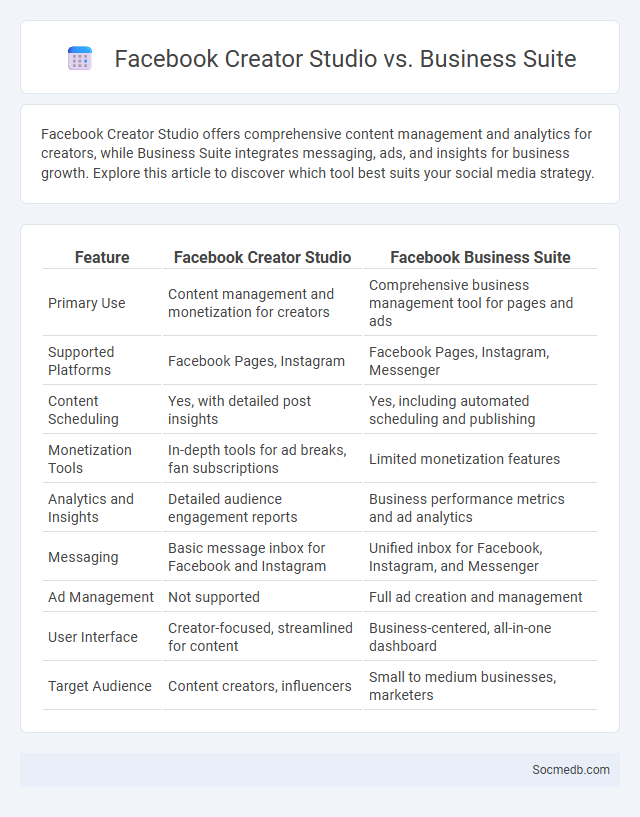
Photo illustration: Facebook Creator Studio vs Business Suite
Facebook Creator Studio offers comprehensive content management and analytics for creators, while Business Suite integrates messaging, ads, and insights for business growth. Explore this article to discover which tool best suits your social media strategy.
Table of Comparison
| Feature | Facebook Creator Studio | Facebook Business Suite |
|---|---|---|
| Primary Use | Content management and monetization for creators | Comprehensive business management tool for pages and ads |
| Supported Platforms | Facebook Pages, Instagram | Facebook Pages, Instagram, Messenger |
| Content Scheduling | Yes, with detailed post insights | Yes, including automated scheduling and publishing |
| Monetization Tools | In-depth tools for ad breaks, fan subscriptions | Limited monetization features |
| Analytics and Insights | Detailed audience engagement reports | Business performance metrics and ad analytics |
| Messaging | Basic message inbox for Facebook and Instagram | Unified inbox for Facebook, Instagram, and Messenger |
| Ad Management | Not supported | Full ad creation and management |
| User Interface | Creator-focused, streamlined for content | Business-centered, all-in-one dashboard |
| Target Audience | Content creators, influencers | Small to medium businesses, marketers |
Overview of Facebook Creator Studio, Business Suite, and Meta Creator Studio
Facebook Creator Studio, Business Suite, and Meta Creator Studio provide comprehensive tools for managing social media content, insights, and engagement efficiently. Creator Studio centers on content publishing and performance analytics across Facebook and Instagram, while Business Suite integrates messaging, notifications, and marketing campaigns to streamline your business operations. Meta Creator Studio combines features of both platforms, offering enhanced creative tools, monetization options, and cross-platform management to maximize your social media impact.
Key Features Comparison: Creator Studio vs Business Suite
Creator Studio offers comprehensive content management and performance analytics specifically designed for Facebook and Instagram, allowing users to schedule posts, track engagement, and monetize content efficiently. Business Suite integrates messaging, notifications, and advertising tools across Facebook, Instagram, and Messenger, providing a unified platform for managing customer interactions and running ad campaigns. Both tools support detailed insights and content scheduling, but Business Suite emphasizes cross-platform communication and advertising capabilities, while Creator Studio focuses more on content creation and revenue optimization.
Supported Platforms & Account Management
Social media platforms such as Facebook, Instagram, Twitter, LinkedIn, and TikTok are supported for comprehensive account management, enabling seamless content scheduling, audience engagement, and performance analytics. Advanced tools offer multi-account integration and centralized dashboards that streamline cross-platform management for businesses and influencers. Targeted features include automated posting, comment moderation, and detailed reporting to optimize social media strategy and growth.
Content Scheduling and Publishing Capabilities
Advanced content scheduling and publishing capabilities enable social media managers to plan posts strategically across multiple platforms, ensuring consistent audience engagement. Tools such as Hootsuite, Buffer, and Sprout Social offer automated publishing, customizable calendars, and optimal timing features to maximize reach and interaction. Efficient content scheduling reduces manual effort, enhances brand visibility, and supports data-driven campaign adjustments.
Analytics and Insights: Measuring Performance
Social media analytics and insights provide critical data to measure your content's performance across platforms like Facebook, Instagram, and Twitter. Key metrics such as engagement rate, reach, impressions, and conversion tracking help identify which strategies drive the most audience interaction and ROI. Leveraging these insights enables you to optimize campaigns, enhance targeting, and improve overall social media effectiveness.
Messaging and Communication Tools
Messaging and communication tools on social media platforms enhance real-time interaction through features like instant messaging, voice calls, and video chats. These tools support multimedia sharing, including images, videos, and voice notes, facilitating richer conversations and stronger connectivity. Integration with AI-driven chatbots and encryption technologies ensures secure, personalized communication experiences for users globally.
Monetization and Revenue Opportunities
Social media platforms offer diverse monetization and revenue opportunities through advertising, influencer partnerships, and subscription models. Businesses leverage targeted ad placements based on user data to maximize ROI and conversion rates. Content creators generate income via brand sponsorships, affiliate marketing, and fan-supported membership programs such as Patreon or YouTube Memberships.
User Experience and Interface Differences
Social media platforms prioritize User Experience (UX) through intuitive navigation, personalized content feeds, and fast-loading interfaces that enhance engagement and satisfaction. User Interface (UI) differences are evident in design elements such as button placement, color schemes, and interactive features, which influence how easily You can interact with content and connect with others. Optimizing both UX and UI ensures seamless communication and a visually appealing environment tailored to diverse user preferences.
Pros and Cons: Selecting the Right Tool
Choosing the right social media platform can significantly enhance Your brand visibility, audience engagement, and marketing ROI by leveraging targeted demographics and specialized content formats. However, each platform comes with varying privacy concerns, time investment, and content lifespan challenges that may affect Your social media strategy's efficiency. Balancing these pros and cons requires a clear understanding of Your business goals, audience preferences, and resource allocation.
Which Platform is Best for Your Facebook Strategy?
Facebook remains the leading platform for targeted advertising with over 2.9 billion monthly active users, making it ideal for businesses looking to reach diverse demographics. Using Facebook Ads Manager allows precise audience segmentation based on age, interests, and behavior, optimizing campaign efficiency. Integrating Facebook with Instagram expands reach, leveraging shared data for cohesive social media marketing strategies.
 socmedb.com
socmedb.com